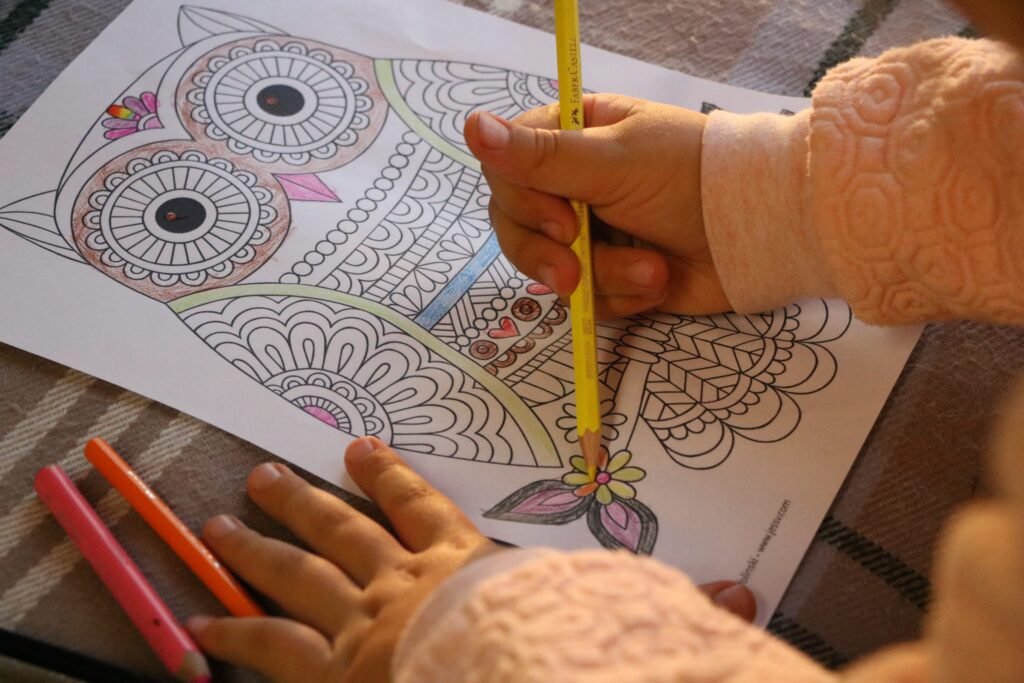Have you ever wondered about the level of intricacy that should be put into coloring pages derived from a novel? The answer lies in finding the perfect balance between simplicity and complexity. While some might prefer coloring pages with intricate details that mirror the fine lines of the original illustrations, others may find more joy in coloring simpler, less overwhelming designs. Ultimately, the decision on how detailed to make these coloring pages rests in your hands, as it depends on your personal preferences and the intended audience for whom the pages are being created.

Importance of Coloring Pages from a Novel
Coloring pages from a novel play a crucial role in engaging and captivating readers of all ages. They provide a unique and interactive experience that allows readers to further immerse themselves in the story. Whether it’s a children’s book, a young adult novel, or even a classic piece of literature, coloring pages offer a multitude of benefits to both readers and artists. By carefully considering the level of detail in these coloring pages, you can create an enriching and enjoyable experience for your target audience.
Considerations for Detailing Coloring Pages
When determining the appropriate level of detail for coloring pages from a novel, several factors should be taken into consideration. These considerations ensure that the coloring pages are well-suited to the target audience and effectively convey the themes and atmosphere of the story.
Age Range of Target Audience
The age range of the target audience is one of the most important factors when deciding on the level of detail for coloring pages. for younger children, simpler and less intricate designs are generally more suitable, as they are easier to color and understand. On the other hand, older readers may appreciate more complex and detailed illustrations that challenge their artistic abilities.
Complexity of the Novel
The complexity of the novel itself should be analyzed to determine the appropriate level of detail for coloring pages. If the story is simple with fewer characters and settings, less detailed coloring pages may suffice. However, for novels with intricate plotlines, richly developed characters, and numerous settings, more detailed coloring pages can help readers fully appreciate the depth and complexity of the story.
Themes and Atmosphere
The themes and atmosphere of the novel should be reflected in the coloring pages. Whether the novel is adventurous, mysterious, or whimsical, the coloring pages should evoke the same emotions and create a cohesive visual narrative. Paying attention to details such as colors, textures, and shading can effectively convey the desired atmosphere and enhance the readers’ experience.
Characterization and Plot
The characterization and plot play a fundamental role in any novel. When designing coloring pages, it is important to highlight key characters and pivotal moments in the story. By emphasizing these elements, readers can fully immerse themselves in the narrative and gain a deeper understanding of the characters and their motivations.
Design and Illustration
The overall design and illustration style of the coloring pages should be aligned with the tone and aesthetics of the novel. Whether you choose a more realistic approach or favor a whimsical and imaginative style, the coloring pages should seamlessly integrate into the novel’s visual world. Consistency in design will enhance the readers’ comprehension and enjoyment.
Balance between Detail and Coloring Space
A delicate balance between detail and coloring space is essential in creating coloring pages. While it may be tempting to include intricate designs, it is equally important to provide ample space for coloring. The coloring experience should be enjoyable and not overwhelming. By finding the right balance, readers can engage with the coloring pages without feeling frustrated or limited.
Factors to Determine Coloring Page Detail Level
To determine the appropriate level of detail for coloring pages, several factors need to be taken into account. These factors help ensure that the coloring pages are tailor-made to the needs and preferences of the target audience.
Target Age Group
The age group you are targeting is a vital factor in determining the level of detail for coloring pages. Younger children often require simpler and less intricate designs, allowing them to practice their fine motor skills without feeling overwhelmed. Older readers, on the other hand, may appreciate more detailed coloring pages that present a higher level of challenge.
Skills and Abilities of the Audiences
The skills and abilities of the target audience are crucial when deciding on the level of detail for coloring pages. Consider the artistic proficiency and motor skills of the readers. Providing coloring pages that match their abilities will encourage them to explore their creative potential and foster a sense of accomplishment.
Time and Resources
The available time and resources, both for readers and creators of coloring pages, should also be considered. More detailed coloring pages may require additional time and effort to complete, which may not be feasible for some readers. Consider the practicality and accessibility of the coloring pages, ensuring that they can be enjoyed without excessive time investment or requiring specific art supplies.
Intent and Purpose of the Coloring Pages
The intent and purpose of the coloring pages should guide the level of detail. Determine whether the coloring pages are meant to be purely recreational or if they serve an educational purpose. In some cases, coloring pages with intricate details may help readers enhance their artistic skills, while simpler designs may be more suitable for relaxation and stress relief.
Benefits of Detailed Coloring Pages
Detailed coloring pages offer a multitude of benefits to readers, particularly when they are thoughtfully designed and tailored to the novel. These benefits go beyond the act of coloring and contribute to a more immersive and enriching reading experience.
Enhanced Immersion and Engagement
Detailed coloring pages allow readers to become fully immersed in the novel’s world. By meticulously recreating scenes, characters, and settings, these coloring pages create a bridge between the reader’s imagination and the author’s vision. The process of coloring becomes an active engagement with the story, deepening the reader’s connection and sense of involvement.
Opportunities for Artistic Expression
Coloring pages provide readers with a unique opportunity for artistic expression. By adding their own creative touch through choosing colors, shading, and adding personal details, readers can exercise their artistic abilities and make the coloring pages their own. This freedom of expression fosters creativity and allows readers to actively participate in the visual interpretation of the novel.
Development of Fine Motor Skills
Working on coloring pages, especially those with finer details, can significantly contribute to the development of fine motor skills. The precise movements required for coloring within intricate lines help refine hand-eye coordination and pencil control. This can be particularly beneficial for younger readers, as they strengthen their fine motor skills while enjoying the novel through coloring.
Enhanced Understanding and Appreciation of the Novel
Coloring pages, when intricately designed and aligned with the novel’s themes and characters, can enhance readers’ understanding and appreciation of the story. As readers carefully color each page and contemplate the details, they find themselves delving deeper into the narrative. Through this process, they gain a fresh perspective, noticing nuances and connections they may have missed during a casual read-through.

Potential Challenges of Detailed Coloring Pages
While detailed coloring pages offer numerous benefits, they can also present certain challenges that need to be considered when creating and utilizing them.
Limited Coloring Space
When coloring pages are highly detailed, a potential challenge is the limited space available for coloring. Depending on the target audience and their artistic preferences, some readers may find the smaller spaces more difficult to color. This might be particularly challenging for younger children or individuals who prefer to use broader strokes.
Overwhelming for Younger Audiences
While detailed coloring pages may be stimulating and engaging for older readers, they can be overwhelming and frustrating for younger audiences. Excessive detail can make coloring feel daunting rather than enjoyable, potentially discouraging younger readers from engaging with the coloring pages altogether. It is essential to strike a balance between complexity and approachability when designing coloring pages for younger audiences.
Higher Production and Printing Costs
The level of detail in coloring pages can impact production and printing costs. More intricate designs may require higher-quality paper, increased ink consumption, and higher printing resolution. These factors can result in higher production costs, particularly when creating coloring books or distributing large quantities of printed coloring pages. It is important to consider the overall budget and available resources when determining the level of detail for coloring pages.
Techniques for Detailing Coloring Pages
To create coloring pages with varying levels of detail, several techniques can be utilized. These techniques help enhance the visual appeal and engagement of the coloring pages, catering to the preferences and abilities of the target audience.
Capturing Core Elements
When designing coloring pages, it is crucial to capture the core elements of the novel. Identify the key characters, significant settings, and pivotal moments in the story. By focusing on these core elements, you can create coloring pages that effectively represent the essence of the novel and engage readers in their coloring journey.
Adding Intricate Patterns and Designs
Intricate patterns and designs can add depth and visual interest to coloring pages. Whether it’s intricate borders, mandalas, or geometric patterns, incorporating these elements within the coloring pages can elevate their aesthetic value. This technique appeals to readers who enjoy detailed and intricate designs, offering them a more challenging coloring experience.
Emphasizing Characters and Settings
Highlighting characters and settings within the coloring pages enhances readers’ connection to the narrative. By providing more detail to these elements, readers can better visualize and immerse themselves in the scenes. The emphasis on characters and settings allows readers to color with purpose, emphasizing the importance of these elements in the novel.
Utilizing Different Line Weights
Varying line weights within the coloring pages can create visual interest and guide the readers’ coloring process. Thicker lines can be used to outline characters and settings, while finer lines can be incorporated for intricate details or backgrounds. This technique helps differentiate between foreground and background elements, making the coloring pages more visually appealing and easier to color.
Creating Varying Levels of Complexity Within a Page
To accommodate different skill levels and artistic capabilities, coloring pages can have varying levels of complexity within a single page. This technique allows readers to choose the level of detail they feel most comfortable with. For example, some readers may enjoy coloring the simpler elements of a page, while others may prefer the challenge of more intricate designs. Providing options for varying complexity levels ensures that the coloring pages cater to a wider range of readers.

Examples of Coloring Page Detailing from Novels
There are several ways to approach the detailing of coloring pages, depending on the novel’s genre, tone, and target audience. Here are some examples of how coloring page detailing can be incorporated to enhance the reading experience:
Simple Outline Depictions
For children’s books or novels with a more minimalistic style, simple outline depictions can be used. These coloring pages focus on essential shapes and bold outlines, allowing younger readers to practice their coloring skills while engaging with the story. This style is also suitable for readers who prefer a clean and uncluttered aesthetic.
Detailed Illustrations with Minimal White Space
Coloring pages with detailed illustrations and minimal white space are ideal for novels with complex plots and rich visuals. These pages offer intricate designs and visual storytelling, exploring multiple layers of detail. They cater to readers who appreciate the challenge of coloring highly detailed and visually captivating scenes.
Intricate Patterns and Designs
Incorporating intricate patterns and designs within coloring pages can add a sense of sophistication and charm. This style is suitable for novels with intricate settings or fantasy elements. Intricate patterns can be incorporated into backgrounds, borders, or accessories, allowing readers to explore their creativity and give the coloring pages a unique touch.
Landscape and Scenery Illustrations
For novels that heavily rely on atmospheric descriptions and vivid settings, landscape and scenery illustrations can be utilized. Coloring pages featuring scenic landscapes, architectural details, or natural environments allow readers to engage with the novel’s world on a visual level. These coloring pages emphasize the immersive qualities of the novel while challenging readers to bring the scenery to life with their coloring choices.
Character-Centric Coloring Pages
Character-centric coloring pages focus primarily on the portrayal of key characters from the novel. This style emphasizes the emotions and characteristics of the characters, allowing readers to delve deeper into their personalities. By providing detailed illustrations of characters, these coloring pages encourage readers to explore the nuances of the novel’s characterization.
Guidelines for Creating Coloring Pages from a Novel
When creating coloring pages from a novel, it is essential to follow certain guidelines to ensure a cohesive and enjoyable experience for the readers:
Maintaining Consistency with the Novel
The coloring pages should reflect the essence and atmosphere of the novel. Take into account the visual descriptions, mood, and themes present in the story when designing the coloring pages. Consistency with the novel will contribute to a seamless integration between the reading experience and the coloring activity.
Considering Branding and Marketing
If the coloring pages are part of a larger brand or marketing strategy, it is crucial to consider the overall branding guidelines when creating the designs. Maintaining consistency in graphic style, color scheme, and typography will reinforce brand recognition and create a cohesive visual identity.
Providing Clear Instructions for Coloring
To ensure a positive coloring experience, clear instructions should be provided alongside the coloring pages. These instructions can range from suggestions on coloring techniques to recommendations for specific coloring materials. Clear instructions and guidance will empower readers to explore their creativity and make informed coloring choices.
Offering Diversity and Inclusivity
When designing coloring pages, it is important to promote diversity and inclusivity. Representing a range of ethnicities, body types, and backgrounds in the character illustrations allows readers to identify with the story on a personal level. By showcasing diverse characters, coloring pages become more relatable and inclusive for a wide range of readers.
Allowing Space for Creative Interpretation
While providing detailed illustrations is important, it is equally important to leave room for readers’ creative interpretation. Leaving certain elements of the coloring pages open for customization encourages readers to bring their unique artistic style to the pages. Allowing space for creative interpretation fosters individuality and provides a sense of ownership over the coloring experience.
Strategies for Adapting Detail Level Based on Need
To cater to a diverse range of readers and their specific needs, it is beneficial to adapt the level of detail in the coloring pages. These strategies ensure that coloring pages are accessible and enjoyable for readers of different skill levels and preferences.
Creating Variations of Coloring Pages
By offering variations of coloring pages, you can provide options for different levels of detail. For example, some pages can have simpler designs for younger or less experienced readers, while other pages can feature more intricate illustrations for those seeking a greater challenge. This approach allows readers to select the coloring pages that align with their skill level and artistic preferences.
Offering Different Levels of Difficulty
Another strategy is to provide coloring pages with different levels of difficulty within a single design. By including sections with varying levels of detail, readers can choose to focus on simpler or more complex elements based on their preference. This approach caters to readers who enjoy both simpler and more intricate designs, ensuring a rewarding experience for all.
Providing Options for Additional Detailing
For readers who enjoy adding their own creative touches, coloring pages can include spaces specifically designated for additional detailing. These sections can be intentionally left blank or include outlines that encourage readers to add their own patterns, textures, or even small illustrations. This approach allows readers to personalize the coloring pages and exercise their artistic freedom.
Conclusion
The level of detail in coloring pages from a novel plays a significant role in engaging readers and enhancing their overall experience. By considering factors such as the target audience’s age range, the complexity of the novel, and the intended purpose of the coloring pages, creators can effectively determine the appropriate level of detail. Detailed coloring pages offer benefits such as enhanced immersion and engagement, artistic expression, fine motor skill development, and deeper understanding and appreciation of the novel. While potential challenges such as limited coloring space and overwhelming complexity exist, these challenges can be addressed through careful design and consideration. By utilizing various techniques, providing options for different skill levels, and adhering to guidelines for creating coloring pages, creators can ensure a cohesive, enjoyable, and inclusive coloring experience for readers of all ages.
















